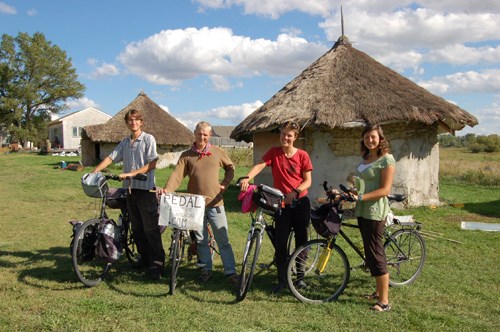A group of youth interested in sustainable living has stopped in Weyburn to take some ideas with them on their 16,000-kilometre journey. They are bicycling across North and Central America to publicize sustainable lifestyles through their youth-led group, Pollinating Experiences, Documenting Action and Learning (PEDAL) Across the Americas.
The group of five young men and women stayed at HELP International Centre for Ecology Research and Training (CERT) over the past week in order to learn about HELP's research in sustainable construction, forestry and agricultural research and waste management innovations.
Their journey began in Guelph, Ontario and the group plans on travelling to Durika, Costa Rica, entirely by bicycle. The group has sought out some of the most successful and innovative examples of individuals and groups demonstrating the skills, technologies and strategies needed to live sustainably throughout the Americas. They will visit these "sustainability models" in nine different countries during their tour.
Garrett Gauthier, tour co-organizer, said that the idea to visit different "sustainability models" came after several members of the group took a trip to a biological reserve in Durika, Costa Rica.
"It's a community of about 35 individuals that are very committed to building, for themselves and to demonstrate to others, what a sustainable livelihood looks like," said Gauthier. "We were all pretty inspired by what they were doing."
Gauthier said the group soon realized, however, that this community in Costa Rica was not so unique.
"There are a lot of people back home in Ontario, throughout Canada, throughout North America and throughout the world that are demonstrating what a sustainable society can do with limited technology and limited financial resources," said Gauthier.
That is when the group realized that it would be worthwhile to experience some "real life" examples of what sustainable living is and how they can share these stories with the world. They are doing just that with constant updates on their website, www.pedalacrosstheamericas.com, about what they have seen and learned.
"We're also trying to share ideas between sustainable communities, as well as to the public, and learn the skills ourselves to become advocates for sustainable living in our future lives," said group member Viera Linderova.
Linderova explained that the word "pollinating" in their title is a metaphor for spreading ideas, or "cross-pollinating" ideas.
One way they have done this is by building a solar-powered water heater out of recycled materials at HELP. They learned about this simple technology at their last sustainable living model stop, Prairies Edge EcoVillage, in Manitoba.
The group repurposed an old glass door, wood, black plastic and pipe to construct the water heater at HELP. It doesn't use any electricity and relies completely on the power of the sun to work.
The group is also taking ideas from HELP, including learning how to mill paper into low-tech, cost effective insulating fibre board and using grain bags to make durable plastic mulch pads.
"It made us realize there are these vast resources all around us that just need innovative thinking to see how they can be used and recycled," said Linderova.
Linderova first came to HELP five years ago as part of the Katimavik youth group and realized that the projects at HELP were very "fitting with their theme."
"It's interesting because (HELP) thinks about living sustainably in this environment but also creates simple technologies that are applicable throughout the world," said Linderova.
Group member Justin Pape explained that sustainable living can happen anywhere and can be relatively simple.
"It can be as simple as putting a bucket in your sink when you're doing dishes and then dumping the water on the lawn to water it, rather than pumping it out of the ground," said Pape.
The group began their journey on July 3 and plans on reaching their final destination in Central America by July of next year. In the end, the cyclists hope to spread the message that a sustainable society is far from just an ideal. By presenting real-world examples of truly sustainable living, the team intends to show the world that constructive solutions to global crises are already in practice across the Americas.




